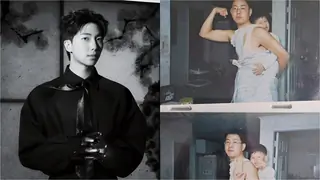Mansi,
I agree with you about the special circumstances of his early life being responsible for Jalal being the way he is, but with some fairly substantial reservations.
First, the age factor. In those days, it was the opposite of what you think, in terms of age related expectations of a person. The average life expectancy was about 35, and everyone had to mature and take on responsibilities from a very young age, both for boys and for girls. Nowadays, a 14 year old is called a child, and a 17 year old a juvenile, who is not thought capable of judging right and wrong and thus can get away lightly even with murder, as in the Nirbhaya case.
In the West these days and increasingly here as well,22 years olds are normally still studying and might do so for some more years, and many of that age are commitment phobic and averse to marriage and its responsibilities. This is the opposite of maturity.
Not so in those days; when fathers died unexpectedly and very young boys had to shoulder the burden of a household.
As for formal education, in a gurukul in those days or thru tutors at home, I doubt if such education, useful in itself, would have made a silk purse out of a sow's ear. But yes, it would, or rather might have made for somewhat greater patience and a greater sense of accommodation towards others.
But even here, princes like Jalal would always have been in a category apart; for how could they have had a number of friends of their age? It was always a very small circle in which they moved, limited to the immediate family, for the next kingdom and comparable royalty of their age would have been a few days ride away. The only way out would have been to have numerous siblings, brothers and sisters, and Jalal of course has no brothers. So he has not had to duke it out with obstreperous younger brothers and to get used to having his will crossed occasionally.
Even so, it is not that he has no capacity for affecfion or no sense of responsibility towards those he cares for; his attitude towards Bakshi Banu is enough to disprove any such ideas.
He is also very affectionate towards, and grateful to both his mentors, almost to excess. This is a very rare quality in an emperor, for royalty is notorious for its sense of entitlement and kings take a lifetime of devoted service to them as no more than their due; gratitude is not even in their dictionary. Jalal is in this respect almost unique.He is also remarkably kind and obliging to Bharmal & Co.; not many
javais would have been so thoughtful, then or now, especially when the wife is so aloof and unaccommodating.
I think the real problem with Jalal, which makes him ultra sensitive when he, very rarely, gives his trust to another person, lies in the circumstances of his early youth. He was in constant danger of his life, not just from his enemies but from his own family, like the uncle who almost killed him as a child. He was on the run, in hiding, always at the mercy of others, always on edge.
This kind of life makes Jalal totally disinclined to trust others who are outside a closed circle - Bairam Khan, Mahaam Anga, Ruqaiya. It is natural and was also entirely necessary. Think of young princes in British history, the ones Richard III, their chacha, had killed in the Tower of London, think of Mary and Elizabeth I, both daughters of Henry VIII, always in terror of the chopping block or of being burnt at the stake.
A potential enemy was not just likely but sure to exhibit a sweet and endearing appearance and behaviour, and Jalal had to be always on guard against treachery from even near ones outside the troika. Jodha, cocooned in Amer and free from the cares and dangers of an empire in the making, could afford to babble about
prem and
vishwas being all important and be ready to trust all and sundry. Not so Jalal.
Which is why the child is so important to him even at that age: which 22 year old today longs for a child? It would have represented an object of his unconditional love, and it would have been all his in a way that no one else had been so far. It would, he would have assumed, have given him unconditional love and a sense of belonging. That is why the loss of that child, not by an act of God, but by the act of murder, affects him so badly. Henry VIII never cared for a child
per se, all he wanted was a son and heir. Jalal wants a child, son or daughter, first, and only then an heir. He wants someone who belongs to him and to whom he can belong.
It is the same with his attitude towards Jodha. To recap some of what I wrote in my Wuthering Depths post of Thursday last:
Very recently, Jalal began, for perhaps the first time in his life, to trust in the unselfish goodness of another human being. He was now sure that the Amer ki shehzaadi was special, that even if she did not care for him and even if she still hated him, she was capable for deep and genuine affection for the child which was already the closest to his heart. Everyone else who was close to him had always wanted something or the other from him, but Jodha was unselfish and undemanding, he believed, and so she was in a class apart.
It was from these heights in Jalal's innermost being that Jodha fell, and fell precipitously, the same night when, after fighting the idea initially and threatening the Khwaja with dire punishment if she turned out to be wrong, Jalal succumbed to what seemed to be a cast iron case against Jodha. Whence also his anguished cry to Jodha, repeated on Friday : Tumne yeh kyon kiya? Tum itne neeche kaise gir sakti ho?
Jalal feels exposed, in his own zehen, as a soft fool, who had succumbed to a hitherto unknown weakness and had placed his trust in, as he now believes, a devious murderess who had channeled the hatred she felt for him into this vile crime, in order to hit him where it would hurt the most. Whence his savage desire now to hurt her as much as he can, to punish her not just for extinguishing his dearest hope and joy, but for having, as he sees it, made a complete fool of him by trampling on the innermost recesses of his being, where no one else had ever been allowed entry.
But in spite of all this, somewhere deep inside, he still hopes that there will be some way to restore that trust, and this feeling fights for domination with the savage hostility he feels towards Jodha specifically.Whence the studied, refined cruelty amounting to sadism towards her, for he hates her above all for, as he sees it, betrayed his very rarely given trust and liking.
The real problem also is that Jalal is an absolute 16th century monarch, with no one to advise him or moderate his reactions to what he sees as betrayal. In any other such set up, Jodha would have been executed out of hand. Asoka the Great pre-Kalinga, or any of the medieval rulers in Europe, the Russian Tsars till the 19th century, would have done the same,with no farce of a trial even. So one has to factor in the era and the key element of absolute power as well. By the standards of his era, Jalal looks almost moderate.
I too can thus understand where Jalal is coming from, and I make allowances for him, though for reasons somewhat different from yours.
Shyamala
Originally posted by: skanda12
Friends, after being one of the people on this Forum roundly and soundly cursing Ekta, her storyline, the behaviour of Jalal, the behaviour (or lack of it) of Jodha, and the dragging out of this whole miscarriage saga for close on ten days ...
... I wanted to express something that has struck me since last night!
In all our judgements of Jalal's behaviour and his extreme prejudice against Jodha and her family (for their prejudice against him!), have we perhaps forgotten the stark truth of Jalal's age?!
* Do you all think that perhaps we should not merely judge Jalal for his role as husband, and as King, but also as a young man of just twenty two, who is barely out of his adolescence, so to speak, with very under-developed emotional maturity?
* Should we perhaps make allowances for the fact that his extremes of behaviour may stem from the fact that he has still not achieved any reasonable self-control over his swinging emotional states that his age creates?
* Could his behaviour be explained by the fact that he may want desperately to be a father, but he is as yet very underdone to really be one because he is unable as yet to handle the highs of happiness and the lows of depression with any measure of emotional equanimity?
Sometimes, people learn early to handle their growth years with some measure of maturity because they get the benefit of some institutionalised education or some form of formal learning system - from teachers or parents - that allows them to discuss and work through their issues. They learn to rub shoulders with others their age - their peers - and to interact with these others in a more civilised way, even if their hormones are raging or teenage or adolescent emotional mood swing or turbulence is high.
We know that Jalal had none of that opportunity. In fact he has always been a young boy on the run from captors and war-oriented, and made to feel that he was just a young boy, in the midst of wily old heads such as Bairam Khan and Mahamanga, who never taught him how to handle emotions. They instead fed him on the easy myth that he has no heart and thus conveniently (conveniently to themselves!) taught him not to acknowledge that emotions exist and that there can be pleasure and pain that can at times be very intense and one has to have the skills to cope with it all. They gave him no coping skills, perhaps because they wanted him to lean on them for these skills and thus stay within their clutches.
The only friend or peer Jalal has ever had has been Ruqaiya, who is even younger than him, and from what we see, rather emotionally immature in her behaviour herself. Her intelligent mind cannot be mistaken for emotional maturity, nor can her ambition be mistaken for emotional control. In fact in the hands of one who is emotionally immature, ambition and intelligence can also go awry. Ruqaiya, if anything, is perhaps absolutely the wrong person, I feel, to be in the vicinity of Jalal at this stage, simply because he should be learning at this time about the skills to manage his emotions rather than be egged on further to ignore his emotions because they seem inconvenient to acknowledge. Ruqaiya shares his yearnings for a child but between them both how much emotional maturity is there to handle the responsibility?
I am not trying to make excuses for Jalal's behaviour here nor am I in a mood to forgive Ekta for extending this torture on viewers, but it was just a passing thought I had that we are looking at Jalal through only two dimensions - the roles he plays as husband and as King. We are all perhaps not giving enough attention to his age and his emotional growth even for this age is inadequate.
A normal twenty two year old in our times is very mature these days, but if we look at him as a product of his times, twenty two was barely an age to be a good husband and a good King. He would have needed much more wisdom than he had to be even that good husband and good King he was expected to be, and the fact that he wanted also to be a good father to a child was probably more than he could handle given his emotional resources at the time. And without formal education and interaction with his age group, and with no one to show him what growth pains are about and how to handle them, he must have found himself all at sea.
The whole thing gets even more complicated for an emotionally under-ready fellow when his new wife comes to his home with much greater emotional maturity than he has, but with her emotions blinded by prejudice. At a time when he needs validation at every emotionally mature step he takes, Jodha may be actually demotivating him or leading him back to unbridled and inexplicable anger by her reactions and prejudices against him.
If this is the case, I can find a corner of sympathy in my heart for him, for being so "naive" when everyone was expecting him to be "wise". And I can understand if Ekta's creative weredeliberately portraying him as a man of "ungrown emotions" and therefore so out of whack in times of trouble.
But his position as both husband and King of a really vast estate, as also his ambitions to be a father as soon as possible, also give him very little time to grow. He has to double up, so to speak, to even run in the same place. So I hope his learning curve from this whole miscarriage episode will be very steep for his own sake.
How many of you agree or disagree with me?
Edited by sashashyam - 12 years ago
































24